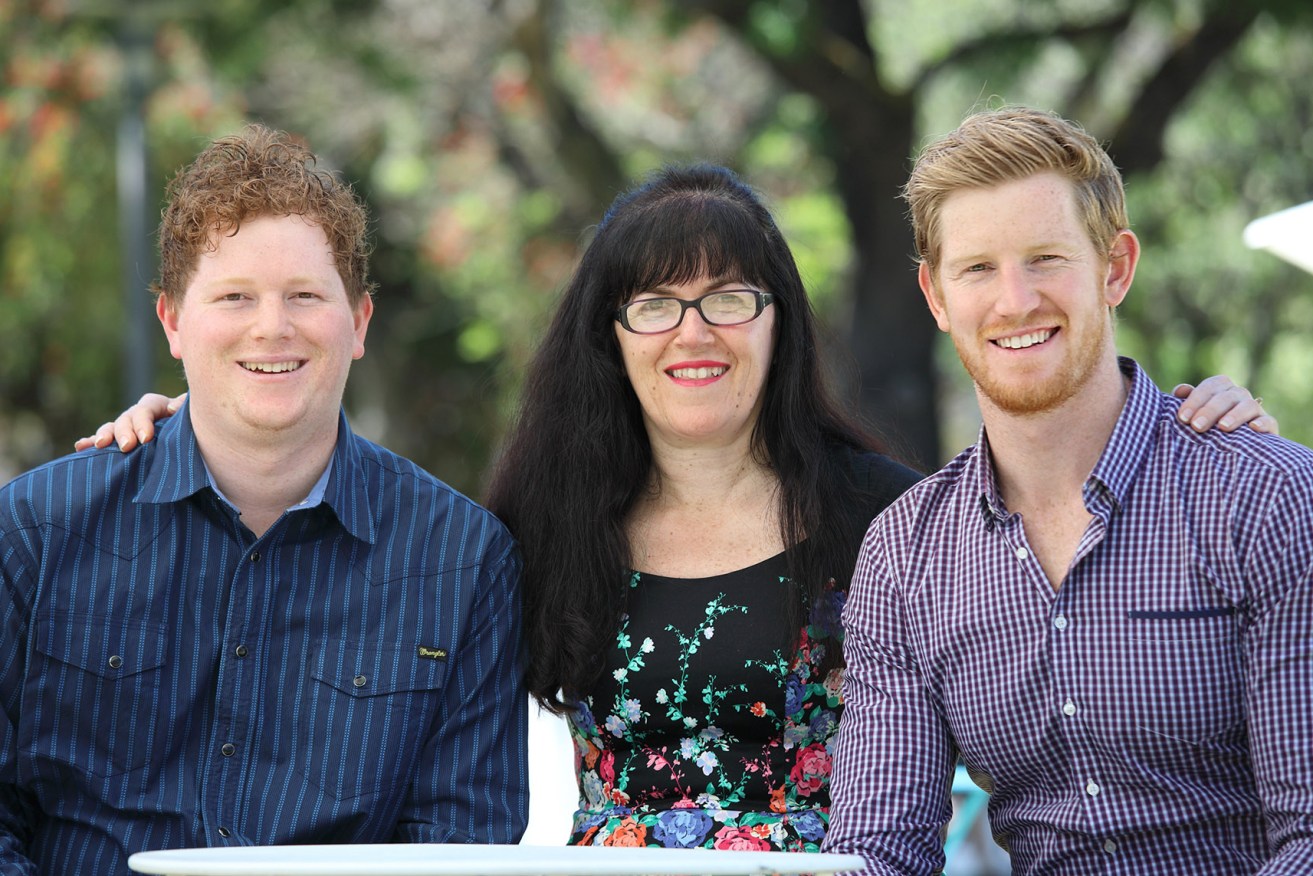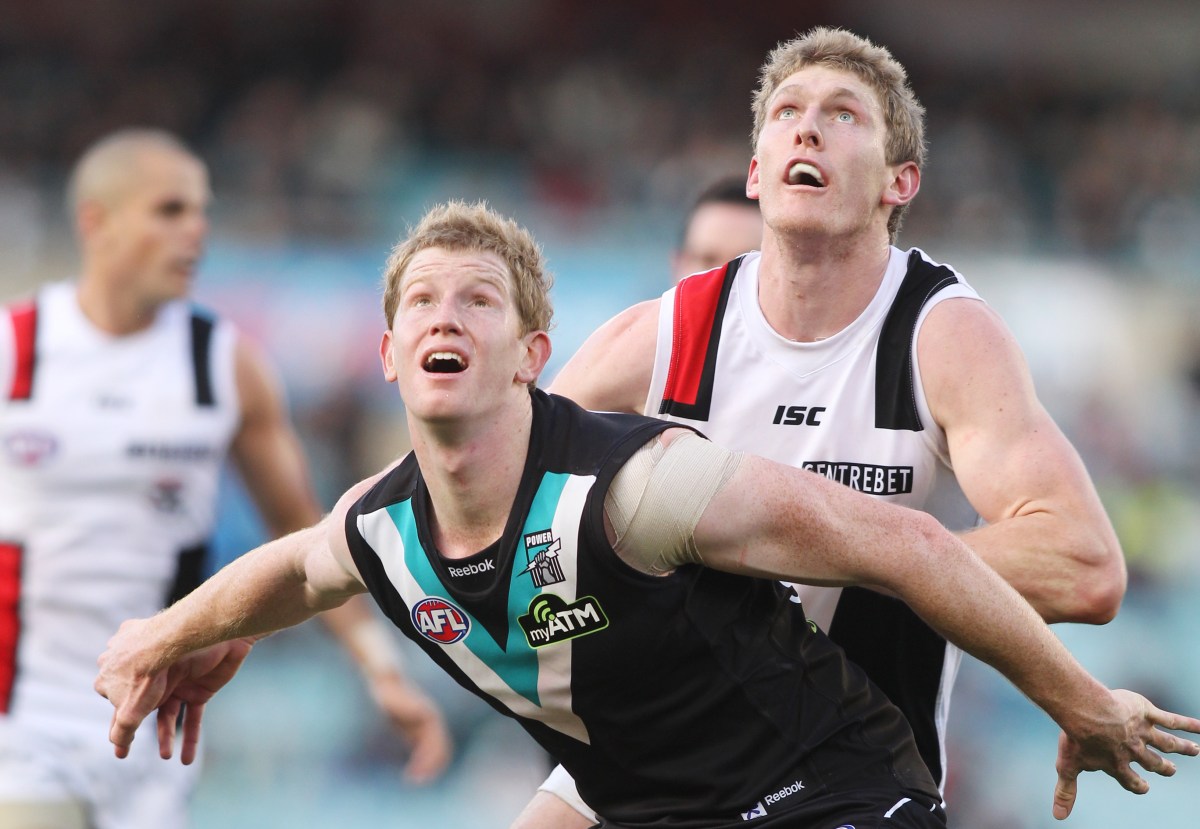Building bravery and compassion out of pain
Last year our eldest son, Matthew Lobbe, chose to become an Ambassador for Lifeline in South Australia. As an AFL player he did what many of them do: he used his public profile to bring about some common good. But what Matt did was more than that: it was a thoughtful response to our family’s close encounters with mental health illness.

Robyn Lobbe with sons Tom (left) and Matthew. Photo: Tony Lewis/InDaily
Once Matt became publicly associated with mental health, it felt almost like signing a permission slip for everyone around him to open up about their own mental health experiences.
I can clearly remember Matt saying that he hoped, in time, going to see a psychologist would be as acceptable as going to see the physiotherapist. Sitting on the sidelines I saw this reality play itself out as more players availed themselves of this wonderful resource, particularly when there were injuries, work performance stress and team pressures to contend with.
While this happened quietly in clubrooms, it was a luncheon during last year’s Mental Health Week involving known athletes sharing their own experiences with mental health that our story truly became public.
Three hundred people arrived at Adelaide Oval to “start a conversation about mental health.” Our middle son Tom and I stared in awe at the swelling crowd, well aware that Matt would be sharing our story soon.
It all felt quite surreal. What gave us the courage to have our experiences shared in such a public setting was the compelling motivation that these might generate real hope or offer strategies for some. This knowledge is incredibly hard-learnt and converting it into a useful purpose somehow helps.
Before the event, I had spent considerable hours writing the stories of both our experiences. As a result, I had relived the journeys – as amother, carer and also a person needing help. I had left it up to Matt to extract those nuggets which would work well to illustrate his answers. That also took some faith!
The lunch began with us all standing at our tables being asked to survey the crowd. Then those people who had a blue sticker on an envelope at their table were asked to sit down. Those of us left standing represented the 55% of Australian adults who would experience a mental health illness in their adult lifetime. Now 55% of 300 is a great many people when you look at it visually like that.
Then those who had a yellow sticker were also asked to sit down. Those of us left standing represented those out of the 55% who would not seek the help that we needed. A sobering set of statistics that took on far more meaning when visually represented.
Several key people from Lifeline spoke about their work. I was staggered to discover that the Adelaide call centre was the busiest in Australia. Yet the statistic that drove home the message most succinctly, was the knowledge that while we were all enjoying a three hour lunch and conversation, 335 crisis calls would be received by Adelaide Lifeline in that short time. There are 600 volunteers who are trained to take those calls at a training cost of $2500 each.
The panel of sports celebrities were then asked to take a seat on the stage. When it became our son Matt’s turn to speak, I turned to Tom beside me and I wondered how he was really feeling. Tom’s experience is an intensely personal experience, and he was still only a young man of 19 when he became unwell in 2010. With a stigma around mental health illness remaining, he was entirely brave to put his story out there in the public domain.
While Tom’s story is a wonderfully encouraging story it’s still his story of what turned his world upside down. Tom had given Matt permission to speak in a very direct way. Matt’s focus would be on how a supportive work environment had been a critical factor in his road to recovery.
Matt explained that he hadn’t experienced a mental health illness himself, but two members of his family had. Then he introduced both Tom and myself to the audience, which I guessed, made us real people.
Unexpectedly, he began his talk with the weekend of his AFL debut game: Anzac Day weekend 2010, Port v St Kilda. While all this was tremendously exciting for Matt at the time, we were experiencing real resistance from Tom.
The only way I can explain it was “one son’s dream was unfolding, while the other son’s dreams were unravelling.”

While Matthew Lobbe’s dreams were unfolding, brother Tom’s were unravelling. Photo: AAP/Ben Macmahon
Tom, at age 19, almost overnight underwent psychosis, and three months later was formally diagnosed with schizophrenia. Much adjustment happened over that first critical six months as Tom rested. He was very unwell and having a learning difficulty on top of schizophrenia really taxed his brain.
Resting involved suspending his apprenticeship, study, driving, sport and attending any groups that made him uncomfortable. At that stage, something as simple as going to a café was too stressful. Yet over time, he began to volunteer his gardening skills and this gave him renewed purpose.
He often volunteered at his grandparents’ retirement village and soon neighbours begged his Nana to share “her gardening grandson”. I always accompanied him, and was regularly called into service. I noted that the older residents didn’t threaten Tom’s well-being and that was excellent progress.
Placing Tom in appropriate employment was a very difficult task. Initially, his DSP Employment Provider was very fortunate to set him up with a gardening service. This allowed Tom to work shorter shifts knowing that his mental health was understood and supported. It was a valuable 18-month bridge as he regained his confidence.
Our next challenge was seeking a supportive work environment in open employment. Finally it was Matt and his mentor Peter who came up with the brilliant idea of approaching Matt’s old school.
At this point, all our lives changed somewhat. For the first time since Tom’s illness began, there was some job certainty and there were some breathing space. We were very grateful. I didn’t feel in charge 24/7 and that was really welcome.
Looking ahead, I think my husband and I both expected to be Tom’s carers for the rest of his life. While on some levels, we will always be in the background, on many important levels, Tom has since kicked huge goals.
Matt and Tom have brought a house together; after six years of Vic Roads Medical Review, Tom now drives his own vehicle with a full, unrestricted licence; and he runs his own business – the Village Gardener.
Our personal anguish is now public. But so is our personal celebration.
At work Tom sets extremely high standards – all lawns should be mown with MCG precision. Many of his gardening clients shower him with morning and afternoon teas, and his original clients send him home with a packed lunch of mammoth proportions. Everybody seems to love Tom.
Tom’s recovery has been a huge delight to us all. He continues to live with an illness that requires much resilience to counter the ongoing voices that are still intruding, but not managing his life.
Our family, like others, has hurt and yet we’ve become even closer because of shared struggles. Imagine how this mother feels today as she hears one son tell the real story of what it’s been like for our family since mental health illness became a part of what ultimately made us all braver and infinitely more compassionate people.
Our story continues to bear more good fruit as both Matt and Tom are the 2017 Ambassadors for the Mental Health Coalition of SA.
Our personal anguish is now public.
But so is our personal celebration.
Both are life shared honestly and richly.
This is the first in a series of stories to mark Mental Health Week, produced with the cooperation of the Mental Health Coalition of SA.




